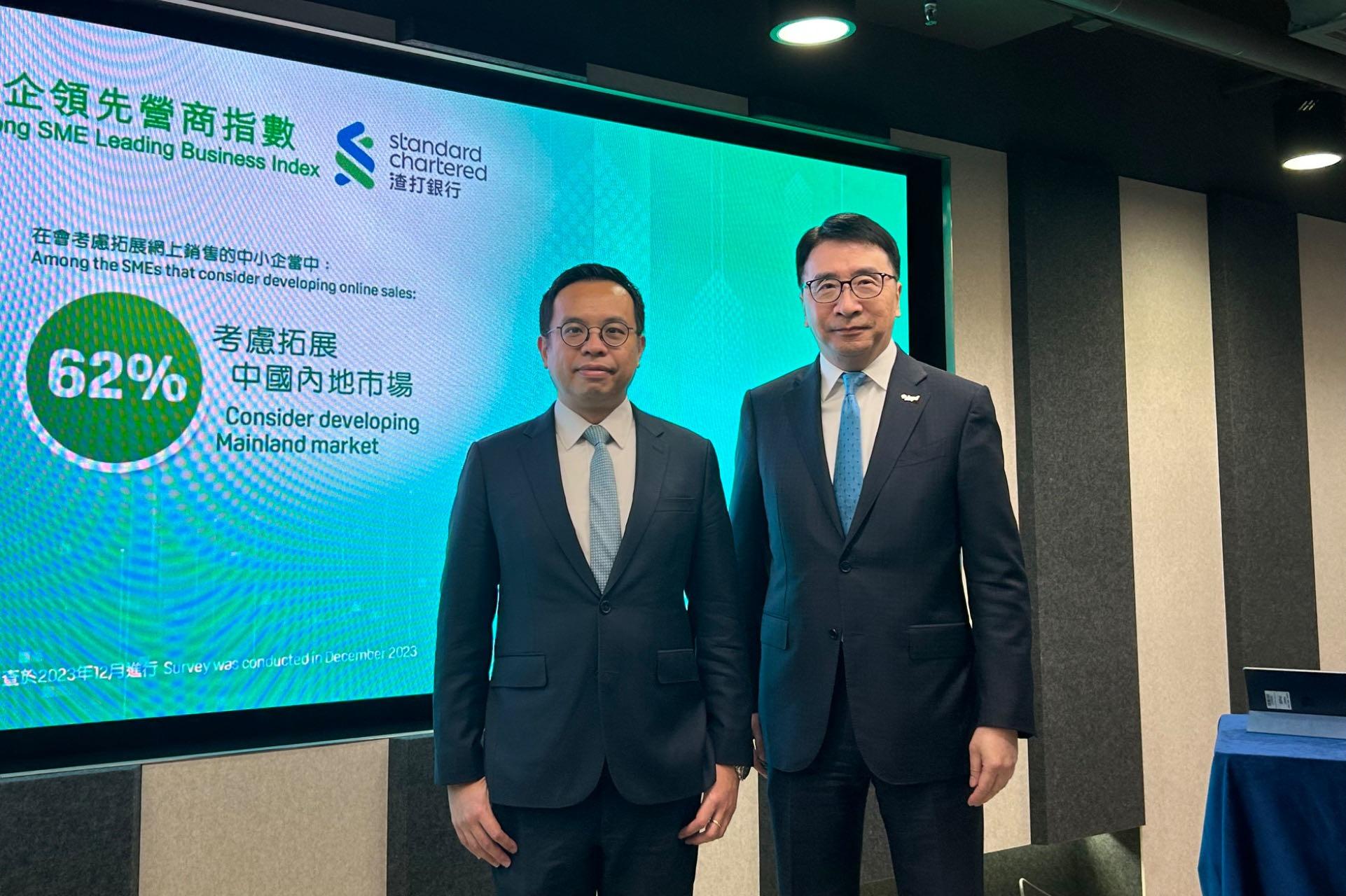 Lawrence Cheung Chi-chong (right), chief innovation officer of the Hong Kong Productivity Council, and Kelvin Lau Kin-hang, senior economist of global research for Greater China of Standard Chartered Bank (Hong Kong), present the Standard Chartered Hong Kong SME Leading Business Index for the first quarter of 2024 on Jan 30, 2024. (LI XIAOYUN/ CHINA DAILY)
Lawrence Cheung Chi-chong (right), chief innovation officer of the Hong Kong Productivity Council, and Kelvin Lau Kin-hang, senior economist of global research for Greater China of Standard Chartered Bank (Hong Kong), present the Standard Chartered Hong Kong SME Leading Business Index for the first quarter of 2024 on Jan 30, 2024. (LI XIAOYUN/ CHINA DAILY)
Hong Kong’s small and medium-sized enterprises have seen a decline in business confidence to levels not seen since the fourth quarter of 2022, as uncertainties surrounding the global economy have dampened sentiment, according to the latest survey by the Hong Kong Productivity Council.
The Standard Chartered Hong Kong SME Leading Business Index dropped by 3.9 points to 43.7 in the first quarter of this year, with declines in four out of the five sub-indices.
While the sub-index for “investment sentiment” remained relatively stable at 48.8, “profit margin” posted the largest decline of 8.3 points, followed by a 7.5-point drop in “business conditions”
While the sub-index for “investment sentiment” remained relatively stable at 48.8, “profit margin” posted the largest decline of 8.3 points, followed by a 7.5-point drop in “business conditions”.
The “global economy” has been waning for three consecutive quarters, accumulating a total decrease of 18 points since the second quarter of last year, reflecting the external challenges faced by Hong Kong SMEs. “Recruitment sentiment”, meanwhile, fell by 1 point.
ALSO READ: HK SMEs' biz confidence at highest level since pandemic
“The global economy is still recovering from the COVID-19 pandemic, and the business environment among local SMEs remains weak. Additionally, geopolitical tensions have created many challenges and uncertainties for the business community,” said Lawrence Cheung Chi-chong, chief innovation officer of the HKPC.
However, sentiment should have been more positive because the findings of the survey, conducted in December last year, failed to reflect the stimulating effects of the recent favorable measures announced by the central government, such as a reduction in banks’ reserve requirement ratio, said Kelvin Lau Kin-hang, senior economist of global research for Greater China at Standard Chartered Bank (Hong Kong).
The survey, covering 808 local SMEs, also found that, among 11 major industries, accommodation and food services saw a decline of 8.4 points, and confidence in the retail sector plummeted below the 40-point mark to 38.8.
The subdued confidence in the tourism-related industries reflects “the change in spending patterns of travelers, which makes it challenging for the market to benefit from it” although the number of visitor arrivals last year rebounded to 55 percent of pre-pandemic levels, much beyond the expected target, Cheung said.
ALSO READ: HK SME sentiment sees positive shift in July
In terms of the overall investment trend, 91 percent of the companies polled said they would maintain or increase their investments in the first quarter of this year, on par with those of the previous quarter. The most popular investment projects among them are training related to e-commerce or digital technology, online or offline marketing promotion, and information and technology.
The findings also showed that although Hong Kong SMEs will face cost pressures from increases in raw material prices and employee wages, most of them do not plan to transfer the burden to consumers, with only 23 percent intending to raise prices of their products or services.
“The silver lining is that SMEs’ recruitment and investment appetite remained relatively stable compared with the previous quarter. This bodes well for the city’s growth driver to continue shifting gradually from domestic-oriented sectors to the more externally oriented ones as the year progresses, which would help extend Hong Kong’s modest recovery trajectory,” Lau said.
A thematic survey conducted during the same period, focusing on the development of e-commerce among SMEs, showed that nearly two-thirds of those developing online sales planned to tap into the Chinese mainland market.
READ MORE: Tech adoption crucial for SME survival in post-virus era
“This shows that SMEs are positive about sales development on the mainland. With the mainland e-commerce industry flourishing in recent years, developing the mainland market can provide immense business opportunities for SMEs,” Cheung said.


